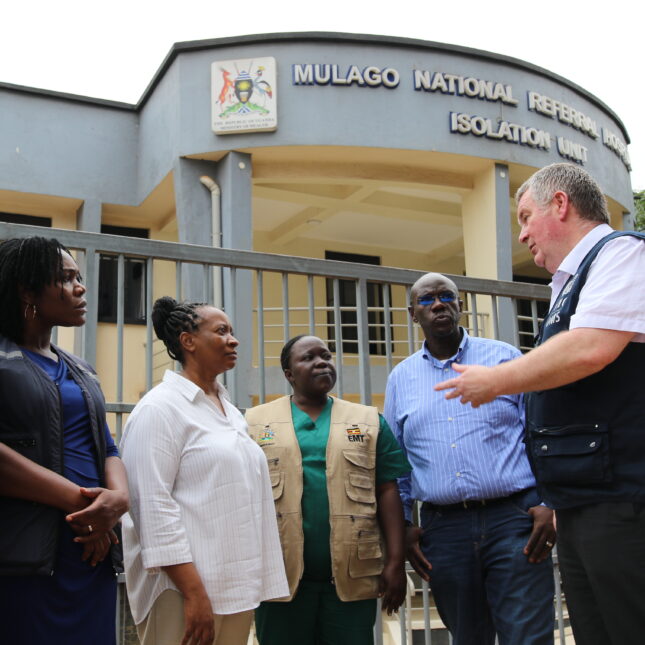
KAMPALA, Feb 3 (NNN-AGENCIES) — The head of the World Health Organization’s health emergencies program said that six people who were in contact with Uganda’s latest Ebola case have become ill, though it’s not yet clear if they too are suffering from the dangerous viral disease.
One is the wife of the patient, who died Wednesday, and several others are health workers.
Mike Ryan said the response to the outbreak is proceeding rapidly, though he noted the Trump administration’s freeze on aid has created shortfalls in key areas that the WHO has had to cover.
Uganda uses funds from the U.S. Agency for International Development to transport samples from suspected cases of HIV, mpox, and Ebola to its national lab for testing. With that money currently not available, the WHO has stepped in, said Ryan. He traveled to Uganda to help with the response and see what assistance the Ugandan government needs.
Likewise, Uganda uses U.S. aid to pay for border entry-and-exit screening at the international airport in Kampala and at two major border crossings. These efforts are critical to ensure that people who might be incubating Ebola do not travel to other countries. For the time being, the WHO will also pick up those costs, he said.
“We really do hope that the U.S., when they complete their review, will be able to restart funding to those specific projects because they are health security projects,” Ryan said.
Vaccination efforts targeting the known contacts and health workers who will be caring for any new cases could begin as early as Sunday, he said, and will use an experimental vaccine being developed by the non-profit group IAVI.
There are two licensed Ebola vaccines, but they protect against Ebola Zaire viruses. The Ugandan outbreak involves a different species of the virus, Ebola Sudan. The IAVI vaccine is made following the approach used by one of the licensed Ebola Zaire vaccines, Merck’s Ervebo.
Supplies of the experimental vaccine — 2,160 doses — are already in Uganda, prepositioned as part of preparatory work the WHO and partners have been doing in recent years to try to help countries at risk of outbreaks of Ebola respond more rapidly. The vaccine is given in one dose.
Uganda has had six previous Ebola outbreaks, including the two largest Ebola Sudan outbreaks on record. One of those, which involved 164 cases and 55 deaths, occurred in 2022.
“As of this evening, the vaccination teams have been trained. They’re fully integrated with the surveillance teams. The protocols have been approved and gone through the whole system,” Ryan said.
To date, at least 234 contacts of the confirmed case have been identified. About half are people who were exposed to the Ebola patient in a health care setting — medical professionals, hospital cleaners, and patients who were on the same ward. It was not known until after the man’s death that he had Ebola, so it is conceivable that health care workers didn’t use the high levels of personal protective equipment needed to prevent transmission of the virus.
It is not yet known how the man, a 32-year-old nurse, contracted Ebola. Given his profession, it is possible that through his work he encountered an Ebola patient who was not diagnosed. Missed cases often occur early in Ebola outbreaks; when patients seek care in hospitals, the size of an outbreak can quickly amplify.
As his illness progressed, the man went to three hospitals, in Kampala and in Mbale City, about 140 miles away. He also visited a traditional healer, whose identity hasn’t yet been determined, Ryan said. He died at Mulago National Referral Hospital in Kampala, where he worked.
It was only after the man died that testing showed that he had had Ebola.
Of the 118 health care-related contacts, about half are in Kampala and half in Mbale. The capital has a national emergency medical team, trained in infectious diseases responses, and a dedicated isolation center with 84 beds. Another similar sized treatment center is being set up by the nonprofit group Doctors Without Borders and the Ugandan government, Ryan said.
The treatment capacity at Mbale is not as advanced, he said, noting WHO is looking into deploying pod-based treatment units. “If something were to kick off in Mbale, it may be more challenging to maintain.”Ryan lauded the Ugandan government’s quick response, and the rapidity with which it reported an outbreak was underway.
“They’ve been open, they’ve invited WHO in, they’ve been radically transparent, and they need to be supported now,” he said, urging other countries not to levy travel bans against Uganda. “What they need is support and assistance and not punishment.” — NNN-AGENCIES



